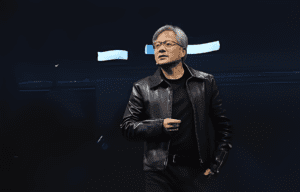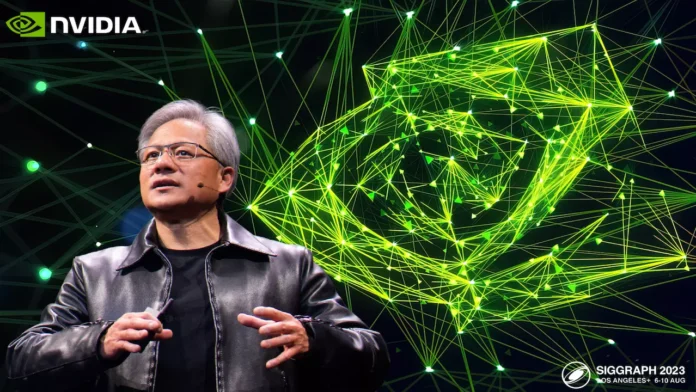AI is gaining more power daily with more updated and advanced technologies. It is always been feared that AI will take human jobs. But we have a deadline now. At a Wednesday event hosted by The New York Times DealBook, Nvidia CEO Jensen Huang predicted that AI will be “fairly competitive” with humans within the next five years. From radiography and medication research to chip design and software creation, Huang predicts that off-the-shelf AI solutions will soon be available for firms to customize according to their requirements. The popularity of Nvidia’s AI chips caused a tripling of the company’s revenue in the fiscal third quarter.
Nvidia CEO Jensen Huang stated that AI is now more advanced than humans. “Within the next five years, you’re going to see, obviously, AIs that can achieve those tests,” Huang predicted at the New York Times’ annual DealBook summit if artificial general intelligence (AGI) is characterized as a computer that can finish tests in a “fairly competitive” manner to human intelligence.

High-powered Graphics Processing Units (GPUs) are in great demand for AI model training and heavy workloads across many industries, including automotive, architecture, electronics, engineering, scientific research, and OpenAI’s ChatGPT. This has led to a boom in Nvidia’s business.
The third quarter of Nvidia’s fiscal year saw a tripling in revenue, with net income increasing to $9.24 billion from $680 million the previous year. Huang recalled bringing “the world’s first AI supercomputer” to OpenAI in the interview that took place on Wednesday. Elon Musk, who co-founded the AI project until leaving it in 2018, overheard Huang discussing the gadget at a presentation and immediately wanted to know more.

Huang added, “Elon saw it and goes, ‘I want one of those.'” Elon also informed Huang about OpenAI. “On that day, I handed over the first artificial intelligence supercomputer to OpenAI.” Regarding the recent upheaval at OpenAI, including changes to the board’s composition and the removal and later restoration of CEO Sam Altman, Huang expressed his hope that things were settling down.
With a “really great team” in mind, Huang expressed his happiness and hope that the players had found a stable environment. Furthermore, it highlights the significance of good corporate governance. Thirty years after our founding, Nvidia is still going strong, overcoming many obstacles. What may have happened if we still needed to do our homework while setting up our business?
According to Huang, commercially available AI tools will emerge due to AI competition. Businesses in various areas, such as radiology, drug research, software development, and chip design, will customize these tools to meet their specific demands.
Crucible Moments by @Sequoia takes a deep dive into our company's groundbreaking evolution. Tune in to learn about our pivotal role in the tech revolution and the future of #AI. #CrucibleMoments https://t.co/JBhpKmaFWX
— NVIDIA (@nvidia) November 30, 2023
Before taking the stage, the audience wanted to know how Huang rated the AI market success of different companies. “I will not assign rankings to my friends,” he declared. “I’ll confess, I’m tempted, but I’m determined not to give in.”
According to Huang, one reason the tech industry is still far from artificial general intelligence (AGI) is that machine learning is good at detection and perception but not multistep reasoning, which is a major goal for businesses and academics. “We’re all trying to solve it,” Huang stated. And technological advancement is occurring at a dizzying rate. “The rate of progress is high,” Huang said without a doubt. “Our current capabilities with these models and AI are certainly related but distinct from one another, as we have come to understand.”




